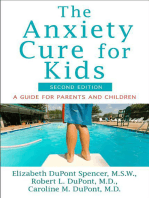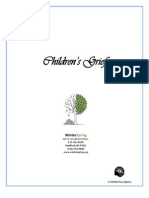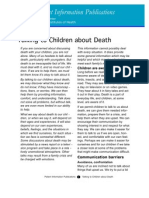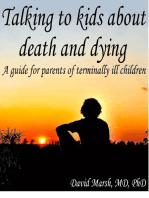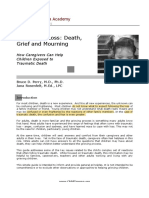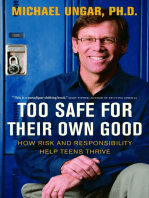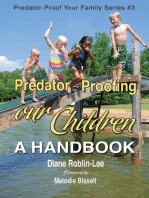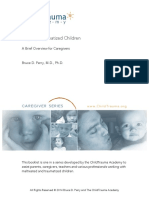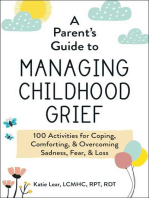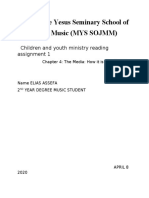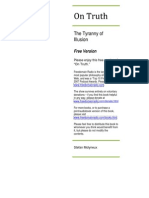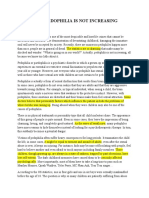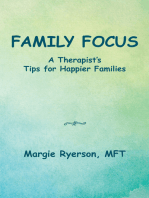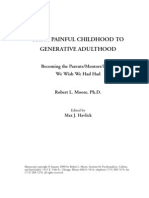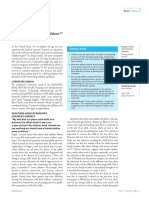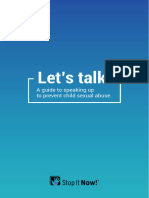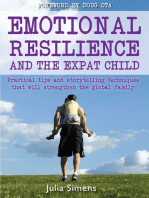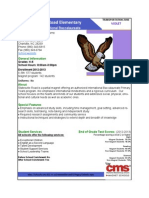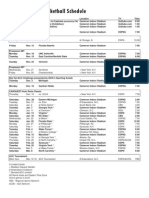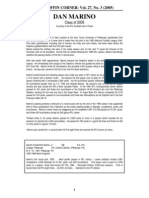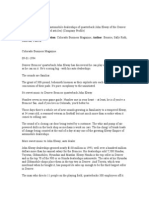Fredrgers
Fredrgers
Uploaded by
bear clawCopyright:
Available Formats
Fredrgers
Fredrgers
Uploaded by
bear clawOriginal Title
Copyright
Available Formats
Share this document
Did you find this document useful?
Is this content inappropriate?
Copyright:
Available Formats
Fredrgers
Fredrgers
Uploaded by
bear clawCopyright:
Available Formats
Special thanks to Family Communications, the producers of Mister Rogers Neighborhood for permission to reprint this material from
The Mister Rogers Parenting Book. For more information on Family Communications and Mister Rogers Neighborhood, visit their website at www.fci.org. This booklet was a collaborative effort between Family Communications and the North Carolina Division of Mental Health, Developmental Disabilities and Substance Abuse Services. The state would also like to extend its gratitude to UNC-TV, North Carolinas public television network, and public television station WTVI Charlotte, for their assistance in distributing this booklet to parents, caregivers, and teachers all across North Carolina. Please visit their websites for more information on their Outreach and Kids Clubs.
Photo: Walt Seng
UNC-TV: www.unctv.org (919) 549-7000
WTVI Charlotte: www.wtvi.org (704) 371-8840
This booklet is also available in Spanish. To view or print this version, or to find other consumer materials provided by The North Carolina Department of Health and Human Services, Division of Mental Health, Developmental Disabilities and Substance Abuse Services, visit our website at http:www.dhhs.state.nc.us/mhddsas/index.html and click on Handling Disasters. Text copyright 2004 Family Communications, Inc.
Helping Children Deal with Tragic Events in the News
Timeless wisdom from Fred Rogers for parents, caregivers and teachers
North Carolina Department of Health and Human Services Division of Mental Health, Developmental Disabilities and Substance Abuse Services 3022 Mail Service Center, Raleigh, North Carolina 27699-3022 Telephone 919-733-7011 Fax 919-733-9455 State of North Carolina, Michael F. Easley, Governor Department of Health and Human Services, Carmen Hooker Odom, Secretary Division of Mental Health, Developmental Disabilities and Substance Abuse, Richard J. Visingardi, PhD., Director 2,300 copies of this public document were printed at a cost of $6,000 or x per copy. 2/04
Photo: Jim Judkis
This material is excerpted with the permission of Family Communications, Inc., from The Mister Rogers Parenting Book. Family communications is the nonprofit company founded by Fred Rogers to produce Mister Rogers Neighborhood and a wide variety of material for and about children. The company continues to support Mister Rogers Neighborhood in its national broadcast on PBS and to expand Fred Rogers legacy in new directions. For more information on Family Communications and Mister Rogers Neighborhood, visit their website at www.fci.org. Text copyright 2004 Family Communications, Inc.
During his lifetime, Fred Rogers became known for his reassuring way of helping families of young children deal with difficult times, beginning with his response to Robert Kennedys assassination. Over the years since then, there have, unfortunately, been other tragic events during which parents and educators turned to him for his calming and thoughtful insight. Fred Rogers wisdom is timeless, and his messages continue to be valuable for children and the people who care for them, as we deal with the events of todays world.
In times of community or world-wide crisis, its easy to assume that young children dont know whats going on. But one things for sure, children are very sensitive to how their parents feel. Theyre keenly aware of the expressions on their parents faces and the tone of their voices. Children sense when their parents are really worried, whether theyre watching the news or talking about it with others. No matter what children know about a crisis, its especially scary for them to realize that their parents are scared.
When children are scared and anxious, they might become more dependent, clingy, and afraid to go to bed at night. Whining, aggressive behavior, or toilet accidents may be their way of asking for more comfort from the important adults in their lives. Little by little, as we adults around them become more confident, hopeful and secure, our children probably will, too.
Scary, confusing images Who will take care of me?
In times of crisis, children want to know, Who will take care of me? Theyre dependent on adults for their survival and security. Theyre naturally self-centered. They need to hear very clearly that their parents are doing all they can to take care of them and to keep them safe. They also need to know that people in the government, in their community and in the world, and other people they dont even know, are working hard to keep them safe, too. The way that news is presented on television can be quite confusing for a young child. The same video segment may be shown over and over again through the day, as if each showing was a different event. Someone who has died turns up alive and then dies again and again. Children often become very anxious since they dont understand much about videotaped replays, close-ups, and camera angles. Any televised danger seems close to home to them because the tragic scenes are taking place on the television set right in their own living room. Children cant tell the difference between whats close and whats far away... whats real and whats pretend... or whats new and whats re-run. The younger the children are, the more likely they are to be interested in the typical news scenes of close-up faces, particularly if the people are expressing strong feelings. When theres tragic news, the images on TV are most often much too graphic and too disturbing for young children.
Helping children feel more secure
Play is one of the important ways young children have of dealing with their concerns. But, even playing about the news can be scary and sometimes unsafe. So adults need to be nearby to redirect that kind of play into nurturing themes, such as a hospital for the wounded or a pretend meal for emergency workers. 2
Turn off the TV
When theres something tragic in the news, many parents get concerned about what and how to tell their children. Its even harder than usual if were struggling with our own powerful feelings about what has happened. Adults may be somewhat surprised that their own reactions to a televised crisis are so strong, but great loss and devastation in the news often reawaken our own earlier losses and fears... even some we thought we have forgotten. Its easy to allow ourselves to get drawn into watching televised news of a crisis for hours and hours; however, exposing ourselves to so many tragedies can make us feel hopeless, insecure, and even depressed. We help our childrenand ourselvesif were able to limit our own television viewing. Our children need us to spend time with themaway from the frightening images on the screen.
Talking and listening
Even if we wanted to, it would be impossible to give our children all the reasons for such things as war, terrorists, abuse, murders, fires, hurricanes, and earthquakes. If they ask questions, our best answer may be to ask them,What do you think happened? If the answer is, I dont know, then the simplest reply might be something like,Im sad about the news, and Im worried. But I love you, and Im here to care for you. If we dont let children know its okay to feel sad and scared, they may try to hide those feelings or think something is wrong with them whenever they do feel that way. They certainly dont need details of whats making us sad or scared, but if we can help them accept their own feelings as natural and normal, their feelings will be much more manageable for them. Angry feelings are also part of being human, especially when we feel powerless. One of the most important messages we can give our children is,Its okay to be angry, but its not okay to hurt ourselves or others. Besides giving children the right to their anger, we can encourage them to find constructive things to do with their feelings. This way, well be giving them useful tools that will serve them all their life and help them to become the worlds future peacemakers... ...the worlds future helpers.
Timeless wisdom from Fred Rogers for parents, caregivers and teachers
4 5
Fred Rogers often told this story about when he was a boy and would see scary things on the news: My mother would say to me,Look for the helpers. You will always find people who are helping. To this day, especially in times of disaster, I remember my mothers words, and I am always comforted by realizing that there are still so many helpersso many caring people in this world.
Try to keep regular routines as normal as possible. Children and adults count on familiar patterns of everyday life. Plan something that you and your child can enjoy together, like taking a walk or going on a picnic, having some quiet time together or doing something silly. It can help to know there are simple things in life that can help us feel better, both in good times and in bad. Even if children dont mention what theyve seen or heard in the news, it can help to ask what they think has happened. If parents dont bring up the subject, children can be left with their misinterpretations. You may be surprised at how much your child has heard from others. Focus attention on the helpers, like the police, firemen, doctors, nurses, paramedics and volunteers. Its reassuring to know there are many caring people who are doing all they can to help in this world. Let your child know if youre making a donation or going to a meeting, writing a letter or e-mail of support, or taking some other action. It can help children know that adults take many different active roles...and that we dont give in to helplessness in time of crisis.
Helpful hints
Do your best to keep the television off, or at least limit how much your child sees of any news event. Try to keep yourself calm. Your presence can help your child feel more secure. Give your child extra comfort and physical affection, like hugs or snuggling up together with a favorite book. Physical comfort goes a long way towards providing security. That closeness can nourish you, too.
You might also like
- ISF - IRAM2 - Risk Evaluation and Risk Treatment Assistant - Practitioner GuideDocument19 pagesISF - IRAM2 - Risk Evaluation and Risk Treatment Assistant - Practitioner Guidekeeperr7No ratings yet
- The Art of Thinking Critically: Ask Great Questions, Spot Illogical Reasoning,From EverandThe Art of Thinking Critically: Ask Great Questions, Spot Illogical Reasoning,Rating: 4 out of 5 stars4/5 (1)
- The Anxiety Cure for Kids: A Guide for Parents and Children (Second Edition)From EverandThe Anxiety Cure for Kids: A Guide for Parents and Children (Second Edition)Rating: 4.5 out of 5 stars4.5/5 (3)
- Cultura Si Civilizatie BritanicaDocument45 pagesCultura Si Civilizatie Britanicabrave-miriamNo ratings yet
- Article Taming The Terrible MomentsDocument3 pagesArticle Taming The Terrible Momentsapi-232349586No ratings yet
- Children's GriefDocument21 pagesChildren's GriefWinterSpringNo ratings yet
- Talking To Children About WarDocument5 pagesTalking To Children About WarholaNo ratings yet
- Guidelines Talking To Kids About AttacksDocument2 pagesGuidelines Talking To Kids About AttacksNEWS CENTER MaineNo ratings yet
- Talking To Children About DeathDocument14 pagesTalking To Children About Deathapi-83101465No ratings yet
- Crime & Violence Speech SbaDocument3 pagesCrime & Violence Speech SbaRichard DerbyNo ratings yet
- Talking To Children About DeathDocument16 pagesTalking To Children About Deathapi-454675280No ratings yet
- Talking to Kids About Death and Dying A Guide for Parents of Terminally Ill ChildrenFrom EverandTalking to Kids About Death and Dying A Guide for Parents of Terminally Ill ChildrenRating: 5 out of 5 stars5/5 (1)
- The Child's Loss: Death, Grief and MourningDocument7 pagesThe Child's Loss: Death, Grief and MourningHermiNo ratings yet
- READ: Letter From MSAD #75 Superintendent Brad SmithDocument3 pagesREAD: Letter From MSAD #75 Superintendent Brad SmithNEWS CENTER MaineNo ratings yet
- Too Safe for Their Own Good: How Risk and Responsibility Help Teens ThriveFrom EverandToo Safe for Their Own Good: How Risk and Responsibility Help Teens ThriveRating: 3.5 out of 5 stars3.5/5 (3)
- When Your Kid Is Hurting: Helping Your Child through the Tough DaysFrom EverandWhen Your Kid Is Hurting: Helping Your Child through the Tough DaysRating: 4 out of 5 stars4/5 (1)
- Helping Children CopeDocument3 pagesHelping Children Copeapi-126978716No ratings yet
- Break the Code of Silence: Raising My Voice to Protect Our KidsFrom EverandBreak the Code of Silence: Raising My Voice to Protect Our KidsNo ratings yet
- Grief GuideDocument32 pagesGrief GuideOana AlexinschiNo ratings yet
- Helping Traumatized Children: A Brief Overview For Caregivers Bruce D. Perry, M.D., PH.DDocument17 pagesHelping Traumatized Children: A Brief Overview For Caregivers Bruce D. Perry, M.D., PH.DhanabbecharaNo ratings yet
- ChildrenDocument12 pagesChildrenapi-309082881No ratings yet
- Talking To Children About A Suicide EngDocument7 pagesTalking To Children About A Suicide EngmariaclarabhNo ratings yet
- Parenting A Child With Special NeedsDocument16 pagesParenting A Child With Special NeedsShiang LinNo ratings yet
- Helping Children Cope With Disaster: A Child's Reaction To Disaster by AgeDocument4 pagesHelping Children Cope With Disaster: A Child's Reaction To Disaster by AgeIvan BodnaryukNo ratings yet
- Child Hypnosis ExplainedDocument28 pagesChild Hypnosis ExplainedAlexander Edo Tondas100% (5)
- Plain Talk About SpankingDocument7 pagesPlain Talk About SpankingropesNo ratings yet
- The 7 Causes of Caregiver Guilt: And 8 Stategies that Give Caregivers Emotional FreedomFrom EverandThe 7 Causes of Caregiver Guilt: And 8 Stategies that Give Caregivers Emotional FreedomNo ratings yet
- Water and FooterDocument11 pagesWater and FooterSen SokhaNo ratings yet
- Helping Teens CopeDocument10 pagesHelping Teens CopeshiveeguptaNo ratings yet
- A Parent's Guide to Managing Childhood Grief: 100 Activities for Coping, Comforting, & Overcoming Sadness, Fear, & LossFrom EverandA Parent's Guide to Managing Childhood Grief: 100 Activities for Coping, Comforting, & Overcoming Sadness, Fear, & LossNo ratings yet
- It's Okay to Cry: A Parent's Guide to Helping Children Through the Losses of LifeFrom EverandIt's Okay to Cry: A Parent's Guide to Helping Children Through the Losses of LifeRating: 5 out of 5 stars5/5 (1)
- Elias Assefa 2nd Year Music StudentDocument9 pagesElias Assefa 2nd Year Music StudentElias AssefaNo ratings yet
- Stefan Molyneux - On Truth. The Tyranny of IllusionDocument73 pagesStefan Molyneux - On Truth. The Tyranny of IllusionhemisusmarmoratusNo ratings yet
- GriefDocument4 pagesGriefapi-83101465No ratings yet
- Topic: Pedophilia Is Not IncreasingDocument3 pagesTopic: Pedophilia Is Not IncreasingÁi Thi DươngNo ratings yet
- Improving Foster CareDocument10 pagesImproving Foster Careapi-318185472No ratings yet
- From Painful Childhood To Generative Adulthood: Becoming The Parents/Mentors/Elders We Wish We Had HadDocument48 pagesFrom Painful Childhood To Generative Adulthood: Becoming The Parents/Mentors/Elders We Wish We Had Hadsushaantb400No ratings yet
- Helping Children Cope With GriefDocument14 pagesHelping Children Cope With GriefjoNo ratings yet
- The Parent's Guide to Talking About Sex: A Complete Guide to Raising (Sexually) Safe, Smart, and Healthy ChildrenFrom EverandThe Parent's Guide to Talking About Sex: A Complete Guide to Raising (Sexually) Safe, Smart, and Healthy ChildrenNo ratings yet
- Telling A Child Someone Has Died From CoDocument4 pagesTelling A Child Someone Has Died From CoHuma MughalNo ratings yet
- Raising Kids Who Choose Safety: The TAMS Method for Child Accident PreventionFrom EverandRaising Kids Who Choose Safety: The TAMS Method for Child Accident PreventionNo ratings yet
- What Do We Tell The ChildrenDocument5 pagesWhat Do We Tell The ChildrenACDSSNo ratings yet
- CAACompletebookDocument160 pagesCAACompletebookElena SwitchNo ratings yet
- Lets Talk 2Document36 pagesLets Talk 2Catherine IguidNo ratings yet
- Breaking the Trance: A Practical Guide for Parenting the Screen-Dependent ChildFrom EverandBreaking the Trance: A Practical Guide for Parenting the Screen-Dependent ChildRating: 4 out of 5 stars4/5 (4)
- Emotional Resilience and the Expat Child: Practical Storytelling Techniques That Will Strengthen The Global FamilyFrom EverandEmotional Resilience and the Expat Child: Practical Storytelling Techniques That Will Strengthen The Global FamilyNo ratings yet
- Helping Teens Cope enDocument10 pagesHelping Teens Cope enEdsel HormachuelasNo ratings yet
- Parental Guide On Difficult Discussions For Tweens: Listening, Discussing, and Parenting Tweens Through PubertyFrom EverandParental Guide On Difficult Discussions For Tweens: Listening, Discussing, and Parenting Tweens Through PubertyNo ratings yet
- Responding to a Sexual Abuse Outcry: Sexual Abuse Intervention HandbookFrom EverandResponding to a Sexual Abuse Outcry: Sexual Abuse Intervention HandbookNo ratings yet
- Warren Dunes State Park: I G A NDocument1 pageWarren Dunes State Park: I G A Nbear clawNo ratings yet
- Limits of EducationDocument21 pagesLimits of Educationbear clawNo ratings yet
- N Canal Street Lot Application: 2014 Steelers Season Reserved Parking ApplicationDocument1 pageN Canal Street Lot Application: 2014 Steelers Season Reserved Parking Applicationbear clawNo ratings yet
- Additional Racist Comments Attributed To Clippers' Donald Sterling ReleasedDocument2 pagesAdditional Racist Comments Attributed To Clippers' Donald Sterling Releasedbear clawNo ratings yet
- Power and Powerlessness byDocument32 pagesPower and Powerlessness bybear clawNo ratings yet
- Responses To Bias:: Donald Sterling of The L.A. ClippersDocument6 pagesResponses To Bias:: Donald Sterling of The L.A. Clippersbear clawNo ratings yet
- Statesville Road Elementary: International BaccalaureateDocument1 pageStatesville Road Elementary: International Baccalaureatebear clawNo ratings yet
- Nor-Gwyn Little League Age Baseball: Line Up CardDocument3 pagesNor-Gwyn Little League Age Baseball: Line Up Cardbear clawNo ratings yet
- 2013-14 Duke Basketball Schedule: Presented by PNCDocument1 page2013-14 Duke Basketball Schedule: Presented by PNCbear clawNo ratings yet
- 2012-2013 Rogers Greenway & Trails: A B C D EDocument2 pages2012-2013 Rogers Greenway & Trails: A B C D Ebear clawNo ratings yet
- 1-3. Kurt Russell Film Festival: Y Y Y Y Y Y Y YDocument2 pages1-3. Kurt Russell Film Festival: Y Y Y Y Y Y Y Ybear clawNo ratings yet
- NHMFL: MO NRO EST - OLD BA INB RID GEDocument2 pagesNHMFL: MO NRO EST - OLD BA INB RID GEbear clawNo ratings yet
- Championship Package: Best Value!Document2 pagesChampionship Package: Best Value!bear clawNo ratings yet
- Tiped ItDocument5 pagesTiped Itbear clawNo ratings yet
- Workig LebronDocument2 pagesWorkig Lebronbear clawNo ratings yet
- It's Game Time! Practice NotesDocument5 pagesIt's Game Time! Practice Notesbear clawNo ratings yet
- Dan Marino: THE COFFIN CORNER: Vol. 27, No. 3 (2005)Document2 pagesDan Marino: THE COFFIN CORNER: Vol. 27, No. 3 (2005)bear clawNo ratings yet
- Title: Elway's Empire. (Automobile Dealerships of Quarterback John Elway of The DenverDocument9 pagesTitle: Elway's Empire. (Automobile Dealerships of Quarterback John Elway of The Denverbear clawNo ratings yet
- The Art and Science of Estimating Project Cash FlowsDocument33 pagesThe Art and Science of Estimating Project Cash FlowsferahNo ratings yet
- 39 Alr 899Document156 pages39 Alr 899legalmatters100% (1)
- 1.1 Patterns & Inductive ReasoningDocument22 pages1.1 Patterns & Inductive ReasoningTravis TothNo ratings yet
- What Is A Black Body ?Document82 pagesWhat Is A Black Body ?Ashwani RatheeNo ratings yet
- Civil Aeronautics Administration v. CA, GR No. L-51806, 8 November 1968Document8 pagesCivil Aeronautics Administration v. CA, GR No. L-51806, 8 November 1968Bryan delimaNo ratings yet
- Revised: Fingerprint Classification Based On Gray-Level Fuzzy Clustering Co-Occurrence MatrixDocument11 pagesRevised: Fingerprint Classification Based On Gray-Level Fuzzy Clustering Co-Occurrence MatrixBhupathi Rama Gopala SwamyNo ratings yet
- Lesson1 Synchronous Sequential CircuitsDocument15 pagesLesson1 Synchronous Sequential CircuitsChristopher EduardNo ratings yet
- SMITH KLINE BECKMAN V CA GR 126627Document2 pagesSMITH KLINE BECKMAN V CA GR 126627Noemi May-osNo ratings yet
- SpeechDocument2 pagesSpeechDEVDEEP SIKDARNo ratings yet
- Damping in BearingDocument4 pagesDamping in BearingRavi Kishore BNo ratings yet
- Linkages of Retailer Personality, Perceived Quality and Purchase Intention With Retailer Loyalty - A Study of Indian Non-Food RetailingDocument8 pagesLinkages of Retailer Personality, Perceived Quality and Purchase Intention With Retailer Loyalty - A Study of Indian Non-Food Retailingvks svkNo ratings yet
- Serial Slaughter Murders in Northern IrelandDocument19 pagesSerial Slaughter Murders in Northern IrelandwaynefishingNo ratings yet
- The Vijayanagara EmpireDocument17 pagesThe Vijayanagara EmpireBaba FakruddinNo ratings yet
- Vikas Singh Parmar: AnalystDocument2 pagesVikas Singh Parmar: Analystpriya vermaNo ratings yet
- Ieee Guide For The Operation Classification Application and Coor PDFDocument68 pagesIeee Guide For The Operation Classification Application and Coor PDFJaime Castañeda SanchezNo ratings yet
- Target Listening 1Document11 pagesTarget Listening 1HELP ACADEMYNo ratings yet
- TSM ArchitectureDocument4 pagesTSM ArchitectureSukanta MukherjeeNo ratings yet
- TR 4 Group 8 The Main Idea and Pronoun ReferenceDocument5 pagesTR 4 Group 8 The Main Idea and Pronoun ReferenceNur Zeb IINo ratings yet
- Aspects of Industrial Design and Their Implications For Society. Case Studies On The Influence of Packaging Design and Placement at The Point of SaleDocument16 pagesAspects of Industrial Design and Their Implications For Society. Case Studies On The Influence of Packaging Design and Placement at The Point of SaleAna Cristina EstimaNo ratings yet
- 100325070351privatisation in Sri Lanka - A Socio-Economic Perspective - 2Document5 pages100325070351privatisation in Sri Lanka - A Socio-Economic Perspective - 2darshani sandamaliNo ratings yet
- Autobiography SpeechDocument3 pagesAutobiography SpeechbenkikNo ratings yet
- Tenez Lab ReportDocument2 pagesTenez Lab ReporttouslandNo ratings yet
- Guide For Applicants LFDocument7 pagesGuide For Applicants LFLívea GodoyNo ratings yet
- A Comparative Analysis Antioxidant Property of Manila Palm Fruits and Leaves Using Mung Bean ModelDocument13 pagesA Comparative Analysis Antioxidant Property of Manila Palm Fruits and Leaves Using Mung Bean ModelSofia Nicole GamboaNo ratings yet
- CV - Rahmaniar Zahra QueenDocument1 pageCV - Rahmaniar Zahra QueenRahmaniarZahraQueenNo ratings yet
- ThanksgivingDocument36 pagesThanksgivingosasNo ratings yet
- Word Combinations, Stress InversionDocument14 pagesWord Combinations, Stress InversionZeenat IshfaqNo ratings yet
- Theodosian CodeDocument7 pagesTheodosian CodeHimat SinghNo ratings yet



